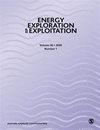Rethinking the governance of geothermal power industry: The roadmap for sustainable development
IF 1.6
4区 工程技术
Q4 ENERGY & FUELS
引用次数: 2
Abstract
The European geothermal heating market, at one time dominated by only a handful of countries, is set to experience a purple patch in the coming years as governments scramble to find an affordable alternative to expensive gas-fired heating. The primary focus of this study will be to investigate what effect will worldwide governance factors and economic growth on the geothermal energy output among the 27 European Countries from the time being 1996 to 2021. Using the autoregressive distributed lag, the findings shows that a significant increase in the geothermal energy industry sustainability can occur in European Union 14 (EU14) emerged economies using worldwide governance factors than in EU13 emerging economies. Among additional factors, instability in the political realm, regulatory issues in the area of quality, accountability, and voice-related issues, and the ability to curb corrupt practices contribute more positively to geothermal energy sustainability in EU14 emerged economies than in European Union 13 (EU13) emerging economies. On the other hand, government effectiveness contributes more positively to geothermal energy sustainability in EU13 emerging economies than in EU14 emerged economies. The finding implies that geothermal power sustainability in EU region countries can be significantly increased by mounting the level of worldwide governance determinants to achieve Energy Union aims by 2030. This will finally be spread to combat climate change and environmental pollution. All observations on projected calculations are valid. The confirmation was achieved with the aid of the three estimators used in the study which are the pooled mean group estimator, the mean group estimator, and the third one was dynamic fixed effect approach. This study recommended that these European countries need to put more effort in terms of being effective in worldwide governance indicators which will help in goal attainment at the societal and environmental levels. Those in charge of making laws in the European countries should get more engaged in worldwide governance scopes as this will assist in facilitating the security and sustainability of geothermal energy generation. Those in charge of making policies in the EU countries should as well lay more emphasis on the strategies that could be cointegrated and as well sustainable toward worldwide governance fractionation toward the achievement of the sustainability of geothermal power and this will drastically reduce the need or dependence on fossil fuel and emissions coming from carbon dioxide in the future time.地热能产业治理再思考:可持续发展的路线图
欧洲地热供暖市场一度仅由少数几个国家主导,但随着各国政府争相寻找价格合理的替代昂贵的燃气供暖方式,该市场将在未来几年经历一段紫色时期。本研究的主要重点将是调查1996年至2021年期间全球治理因素和经济增长对27个欧洲国家地热能产出的影响。利用自回归分布滞后,研究结果表明,使用全球治理因素,欧盟14国(EU14)新兴经济体的地热能产业可持续性比欧盟13国新兴经济体显著提高。在其他因素中,政治领域的不稳定,质量、问责制和声音相关问题领域的监管问题,以及遏制腐败行为的能力,对欧盟14国新兴经济体的地热能可持续性的贡献比欧盟13国(EU13)新兴经济体更积极。另一方面,与欧盟14个新兴经济体相比,欧盟13个新兴经济体的政府效率对地热能可持续性的贡献更为积极。这一发现意味着,通过提高全球治理决定因素的水平,到2030年实现能源联盟的目标,可以显著提高欧盟地区国家的地热能可持续性。这将最终推广到应对气候变化和环境污染。对预测计算的所有观察结果都是有效的。研究中使用了三种估计方法,即混合平均组估计方法、平均组估计方法和动态固定效应估计方法。这项研究建议,这些欧洲国家需要在有效的全球治理指标方面付出更多努力,这将有助于在社会和环境层面实现目标。欧洲国家负责制定法律的人应该更多地参与全球治理范围,因为这将有助于促进地热发电的安全性和可持续性。那些在欧盟国家负责制定政策的人也应该把更多的重点放在可以共同整合的战略上,以及对全球治理的可持续发展,对地热发电的可持续性的实现,这将大大减少对化石燃料的需求或依赖,以及未来二氧化碳的排放。
本文章由计算机程序翻译,如有差异,请以英文原文为准。
求助全文
约1分钟内获得全文
求助全文
来源期刊

Energy Exploration & Exploitation
工程技术-能源与燃料
CiteScore
5.40
自引率
3.70%
发文量
78
审稿时长
3.9 months
期刊介绍:
Energy Exploration & Exploitation is a peer-reviewed, open access journal that provides up-to-date, informative reviews and original articles on important issues in the exploration, exploitation, use and economics of the world’s energy resources.
 求助内容:
求助内容: 应助结果提醒方式:
应助结果提醒方式:


